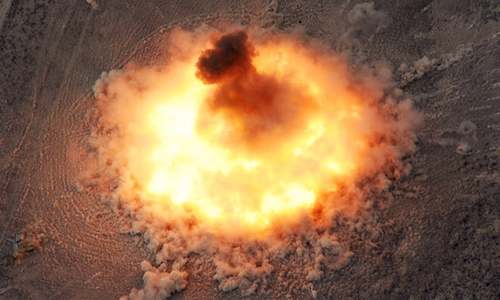KABUL: United State troops are still battling suspected fighters of the militant Islamic State (IS) group near the site where a massive bomb was dropped in eastern Afghanistan last week, a US military official said on Wednesday.
The GBU-43 Massive Ordnance Air Blast bomb was dropped last Thursday from an American MC-130 aircraft in the Achin district of Nangarhar province, bordering Pakistan.
Since then questions have surrounded the decision to use the weapon, which is one of the largest conventional bombs ever used in combat by the US military.
Afghan estimates of heavy militant losses and no civilian casualties have been impossible to verify in the remote region, with access to the area where the bomb fell still blocked.
The strike drew condemnation from some prominent figures, including former Afghan president Hamid Karzai and Afghanistan’s ambassador to Pakistan.
After arriving at the site the day after the strike, US troops fighting alongside Afghan forces had since left, but continued to conduct operations in the broader area, United States military spokesman Capt William Salvin said.
“Access has been restricted but that’s because it’s a combat zone,” he told Reuters. “We are in contact with the enemy.”
Echoing initial estimates, the spokesman said the US military had “high confidence” that no civilians were harmed.
Some Afghan officials have complained of a lack of information about the effects of the bomb.
“We were and we are kept in the dark and still we haven’t been able to go to the site,” an Afghan security official said.
In meetings of the Afghan security council, some ministers told President Ashraf Ghani they feared the lack of information from the US side could be exploited by the IS, which had continued radio broadcasts claiming none of its fighters were killed. “We haven’t suffered any casualties from this bomb,” said a recent IS broadcast.
Capt Salvin would not comment on claims by Afghan defence officials that nearly 100 IS fighters died in the strike. The attack was aimed at destroying an “extensive” complex of fortified tunnels and mines and not any particularly large concentration of fighters, he said.
Published in Dawn, April 20th, 2017













































